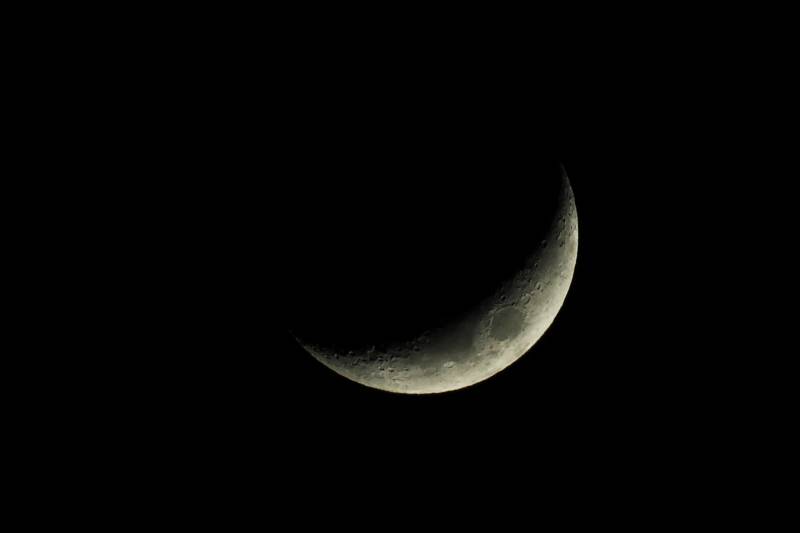Right now, Muslims around the world are observing Ramadan — a holy month of fasting, spiritual healing, and practicing mindfulness.
For most, it’s a time to connect with God through prayers, learn about the teachings of the Quran, reflect on the challenges of those in need and partake in charitable activities.
Here’s all you need to know about Ramadan: the historical, astronomical and spiritual meanings behind this holy month.
The astronomy of Ramadan
The Islamic calendar or the lunar calendar follows the monthly cycles of the moon's phases. The beginning and end of a lunar month are determined when the newborn crescent moon — or waxing crescent moon — is seen in the night sky, appearing one night after the new moon.
For thousands of years — before satellites and telescopes were created — Ramadan was determined by moon sightings by the naked eye. If the newborn crescent moon was sighted, then that evening during sunset marked the first night of Ramadan. But if it wasn’t directly observed (for example, because of inclement weather) it was assumed that Ramadan would begin the next night.
Today, due to technological advancements, the calculation of the first day of a lunar month can be accurate and dependable, without seeing the actual newborn crescent moon with the naked eye. So because there are two methods of determining a new lunar month or Ramadan — through astronomical calculations and moon sightings — Muslims around the world sometimes observe the beginning of Ramadan (and its end, Eid al-Fitr) on different days.
Some people follow just the astronomical calculations of the new lunar month to determine Ramadan, and some “do a combination of the calculations and the moon sighting, a combination of science and sighting,” says Alauddin El-Bakri, a Bay Area spiritual leader, religious director, teacher and imam, and a member of the Islamic Society of North America (ISNA). El-Bakri is based at the West Valley Muslim Association in Saratoga, and speaks at seven other mosques in the Bay Area.
“We have people either following the astronomical calculation, which is accurate, or they're following their eyes — which is also accurate,” El-Bakri says. That the community can have two different days to mark the start of Ramadan and two different Eids is “normal, natural and actually beautiful,” he says.
Why do Ramadan and Eid dates change every year?
It’s all about the moon.
The months in a lunar calendar only have 29 or 30 days, with 354 days in a lunar year — which is 11 days shorter than the solar or Gregorian calendar.
Because of this, every year Ramadan falls 10 to 11 days earlier than the previous year. Back in 2010, Ramadan began in November, and this year it began on the evening of April 1.
A brief history of Ramadan
Ramadan is the ninth month of the Islamic calendar, and was said to be the month the Quran was revealed to the prophet Muhammad in the year 610 AD. It is, says El-Bakri, “the birth month of the Quran.”
He adds that Ramadan "is the birth month of Islam. And the night of destiny happened on one of the last 10 nights of Ramadan.”
The “night of destiny,” or Laylat al-Qadr, is said to be the specific day the Quran was revealed. And while El-Bakri says the exact night itself is not specifically known, it took place “on one of the last 10 nights of Ramadan.” This period therefore has a special significance to Muslims, and is usually observed by performing special nightly prayers at home or at the mosques.
During Ramadan, Muslims fast from dawn until dusk, usually breaking their fasts with dates and fruits, before continuing their iftar of a full meal. Later in the night — only during Ramadan — there are special prayers called tarawih that are performed either at home or at the mosque. Usually it's during Ramadan that Muslims make their annual, obligatory charitable donations to those who need it.
El-Bakri says that during Ramadan, the fasting actually occurs on multiple levels. It’s not just about fasting from food and water — it's also about fasting from nafs, or ego, which defines a person’s desires and wants; fasting from devastating emotions like anger, hatred, fear and extreme sadness; fasting the mind from negative thoughts; and fasting from negative elements that don’t benefit the soul. During a fast, “the goals are to always speak the truth, establish justice on Earth, and be merciful in every way, whether with your own family, humanity or with the planet,” says El-Bakri.
To join your local Muslim community for the breaking of the fast, you can check out community or mosque calendars in your area. The Muslim Community Association of the Bay Area offers daily iftars for the general public, and donations are recommended but not required. The MCC East Bay also has a schedule for iftars and all are encouraged to join — registrations are usually encouraged so organizers can ensure the right amount of food is available.
